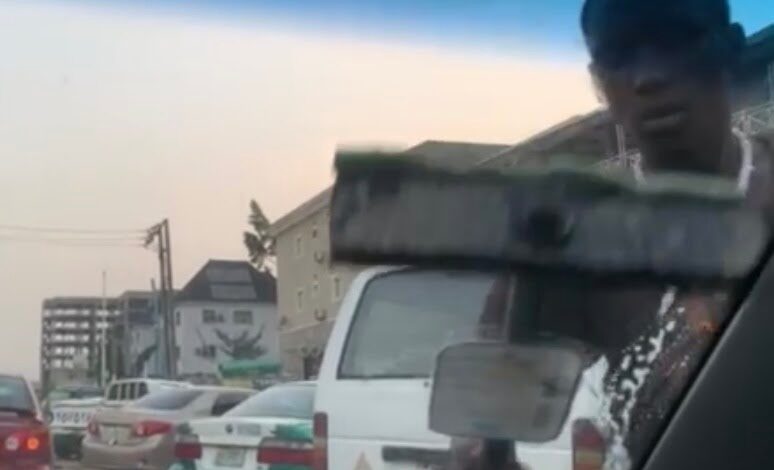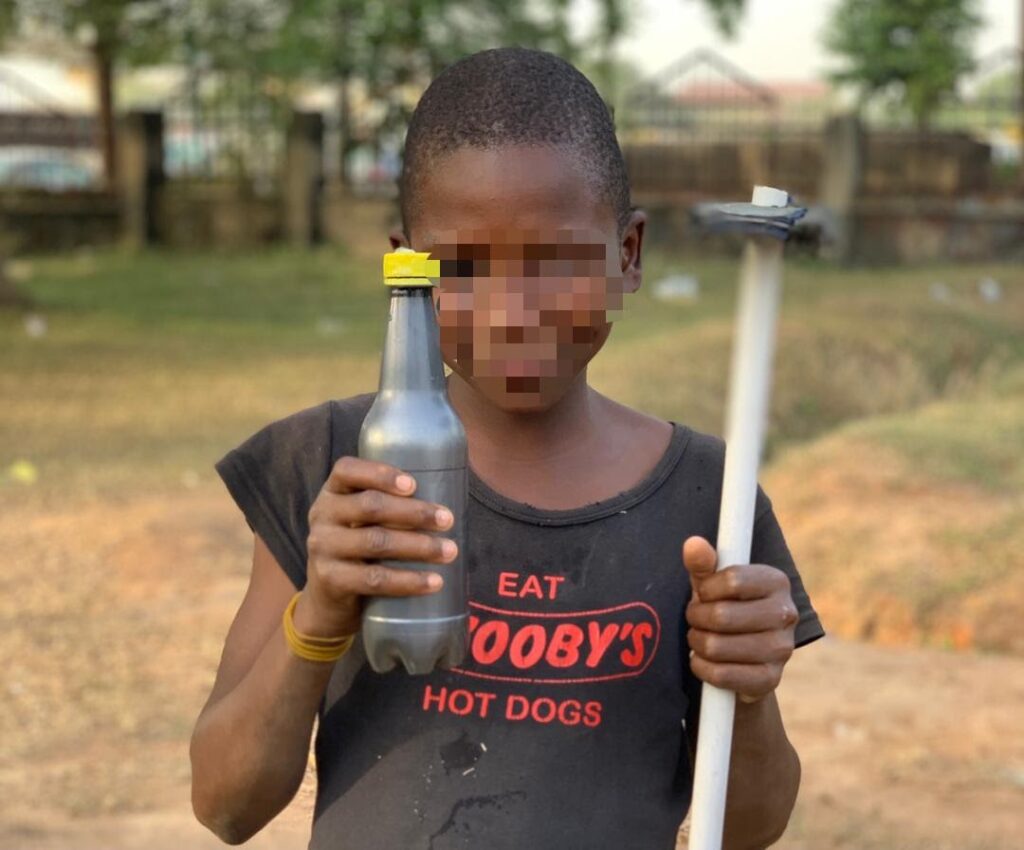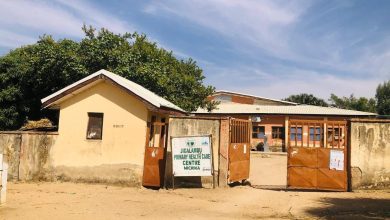Uncertainty, Mixed Feelings About Abuja’s ‘Wiper Boys’
While some see them as a nuisance or a threat to safety, boys who clean car windshields on Abuja's streets say they feel unsafe too but are trying to survive.

Sitting underneath the shade of a tree, holding a plastic bottle filled with soapy water on one hand and a wiping gear on the other, are Buhari, Usman, Yusuf, and Abubakar, waiting for the traffic lights to turn red so they can hurry to cars and wipe their screens.
Usman, 10, was once a beggar. Now, wiping windshields makes him feel he is earning the money he gets.
“Sometimes when we clean their glass they give us 20, 50 naira, or a hundred,” he said, showing off his wiping gear made with absorbent sponge foam and pieces of rubber slippers fixed to a handle. An improvised squeegee.
On most intersections in the Abuja Municipal Area of the Federal Capital Territory (FCT), teenage boys scurry to cars at traffic lights, spray soapy water on windshields and wipe diligently. This has become a familiar sight.
While some residents think they are a nuisance, others see them as a security threat. But these boys say they are just trying to earn money to survive.
Thirteen-year-old Yusuf, for example, wipes car windshields so he can feed himself, his mother, and his three junior sisters after they fled from Kankara Local Government Area (LGA) of Kastina State, Northwest Nigeria where he lost his father to terror attacks.
Yusuf does not spend his days cleaning windshields only but does other odd jobs to sustain himself and his family.
“When I wake up in the morning, I go around the market in my neighbourhood packing trash. I get paid 50 or 100 naira from each person I help. From there I buy foodstuffs and take it home so my mother can make breakfast.”
Yusuf added that after breakfast, he picks up his squeegee, gets together with the other boys to begin the task of cleaning windscreens before traffic lights turn green.
“Some people don’t give us money after cleaning so we have to beg them to give us something at least. If we don’t come out here we will not eat.”

Buhari, 12, and Abubakar, 10, are brothers who live with their families in Gwarimpa Estate. Buhari, who is less timid than his brother, told HumAngle how security guards accuse them of stealing and keep chasing them away from their location.
“I swear to God, none of us here has ever stolen. We only come here to make money, if not we will go to bed hungry,” he said.
Buhari added that sometimes he and his brother clean windshields from noon after school to 11 p.m. WAT to midnight “the money we get also goes to our school fees.”
When asked if they weren’t scared, Buhari in unison with the other boys said they are just as scared of the people on the other side of the windshield but are sure God is protecting them. “I have Allah in my heart,” Buhari said in Hausa.
On the other side of the windshield
There were mixed reactions from residents concerning the boys they refer to as ‘wiper boys’. Salim, who lives in Zone 4, a part of Wuse district, believes they are a nuisance.
“Personally, I don’t like it when they clean my glass because they end up dirtying it,” he said, adding that they can be a danger to society if they remain on the streets for too long.
“As they get older, they may become productive in a negative way.”
Meanwhile, Muhammad sees it as a hustle but says it is annoying that the wiper boys approach cars without permission.
“The fluid they use spoils screens. When they don’t ask for permission, we get annoyed and end up not paying them.”
Agreeing with Muhammad, Femi also finds it manipulative that wiper boys don’t ask for permission, which forces people to pay for a service they did not solicit.
“I think they do that because if they keep asking people, eight out of 10 will say no.”
On the other hand, Ibrahim says he is indifferent about them and what they do, but admits that they are better than beggars who go around asking for money.
Differing from the ‘hustle’ narrative, Esther (not real name) is of the opinion that if they want to earn money they should hawk tangible items instead.
What respondents unanimously agree on, however, is how the boys can be pulled into unlawful acts for an amount higher than what they normally earn. This could be easy due to their vulnerability.
A security threat?
According to the Assistant Director of Abuja Environmental Protection Board (AEPB), Kaka Bello, such activities are prohibited by the AEPB Act. But since some of the boys are underage, they are not seized and charged to court but handed over to social welfare services.
“It depends on who you ask and what people observe about them, but the FCT does not profile them as a ‘security threat’ rather they are minors in need of help,” he said.
Bello added that the word ‘arrest’ isn’t in their books when it comes to minors on the street, rather they ‘remove’ them. He presented HumAngle with collated data of children taken off the streets which shows that from Jan. to Oct. 2021 a total of 338 were removed. That is an average of 34 children apprehended and handed over to social welfare on a monthly basis.
Amar Sani, Director of social welfare services at the FCT Social Development Secretariat (SDS) explained that some of the boys come from conflict-torn zones, ‘broken homes’, or are trafficked to make money for someone else.
“When we assess and they fall into either of the categories, we get them the help they need. These are minors, not criminals,” he said.
Psychosocial counseling, skill acquisition exercises, charging negligent parents with fines, and in some cases involving the National Agency for Prohibition of Trafficking in Persons (NAPTIP) to arrest and jail traffickers are some of the efforts of the FCT SDS.
However, Sani explained that while the number of street minors in the FCT may decrease from time to time, some of these children return to their dealings in neighboring towns that are out of the SDS’s jurisdiction.
A ripple effect of child poverty
While not all children from poor backgrounds are on the streets, it has become the biggest reason.
Elizabeth Achimugu, a child’s rights activist, made this known in a phone interview. She said children subjected to labour or pushed to the streets to earn money are those who may have become a burden for their parents or guardians.
According to statistics 40.1 per cent of the Nigerian population lived in poverty in 2019 and these figures are likely to increase to 45 per cent by 2022 due to factors like the COVID-19 pandemic, climate change, and the worsening conflict in some regions of the country.
“Society has failed them.” She said, “That is why the government needs to enforce that people give birth to only children they can cater for.”
For Yusuf, Buhari, Abubakar and Usman who have desires of becoming a doctor, business man, teacher and soldier, respectively, staying and being hardened on the street makes these aspirations harder to achieve.
Support Our Journalism
There are millions of ordinary people affected by conflict in Africa whose stories are missing in the mainstream media. HumAngle is determined to tell those challenging and under-reported stories, hoping that the people impacted by these conflicts will find the safety and security they deserve.
To ensure that we continue to provide public service coverage, we have a small favour to ask you. We want you to be part of our journalistic endeavour by contributing a token to us.
Your donation will further promote a robust, free, and independent media.
Donate HereStay Closer To The Stories That Matter




